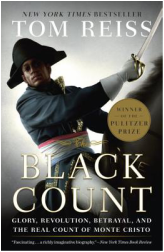
I am not very good at history, and about French history, I know even less, so to learn of the real-life existence behind the famous Alexandre Dumas novels was intriguing. It, of course, makes me want now to reread The Count of Monte Cristo and The Three Musketeers.
I was amazed at the history of racial integration so early in French society, and then equally appalled at Napoleon's turn back to a slave state.
My only wish for the book is that it had spent more time on General Dumas and less on the politics of the Revolution, but perhaps that's not really possible. Much of the political history, however, was a blur for me and I kept hoping for more of the General's story. In the end, though, it was an eye-opening history of a man I never knew existed, who played such a central role in the rapidly changing and tumultuous times in France (and Italy and Egypt, etc.).
from the publisher: The Black Count: Glory, Revolution, Betrayal, and the Real Count of Monte Cristo
General Alex Dumas is a man almost unknown today, yet his story is strikingly familiar--because his son, the novelist Alexandre Dumas, used his larger-than-life feats as inspiration for such classics as The Count of Monte Cristo and The Three Musketeers.
But hidden behind General Dumas's swashbuckling adventures was an even more incredible secret: he was the son of a black slave--who rose higher in the white world than any man of his race would before our own time.
Born in Saint-Domingue (now Haiti), Alex Dumas made his way to Paris, where he rose to command armies at the height of the Revolution--until he met an implacable enemy he could not defeat.
TIME magazine called The Black Count "one of those quintessentially human stories of strength and courage that sheds light on the historical moment that made it possible." It is also a heartbreaking story of the enduring bonds of love between a father and son.
I was amazed at the history of racial integration so early in French society, and then equally appalled at Napoleon's turn back to a slave state.
My only wish for the book is that it had spent more time on General Dumas and less on the politics of the Revolution, but perhaps that's not really possible. Much of the political history, however, was a blur for me and I kept hoping for more of the General's story. In the end, though, it was an eye-opening history of a man I never knew existed, who played such a central role in the rapidly changing and tumultuous times in France (and Italy and Egypt, etc.).
from the publisher: The Black Count: Glory, Revolution, Betrayal, and the Real Count of Monte Cristo
General Alex Dumas is a man almost unknown today, yet his story is strikingly familiar--because his son, the novelist Alexandre Dumas, used his larger-than-life feats as inspiration for such classics as The Count of Monte Cristo and The Three Musketeers.
But hidden behind General Dumas's swashbuckling adventures was an even more incredible secret: he was the son of a black slave--who rose higher in the white world than any man of his race would before our own time.
Born in Saint-Domingue (now Haiti), Alex Dumas made his way to Paris, where he rose to command armies at the height of the Revolution--until he met an implacable enemy he could not defeat.
TIME magazine called The Black Count "one of those quintessentially human stories of strength and courage that sheds light on the historical moment that made it possible." It is also a heartbreaking story of the enduring bonds of love between a father and son.
 RSS Feed
RSS Feed
